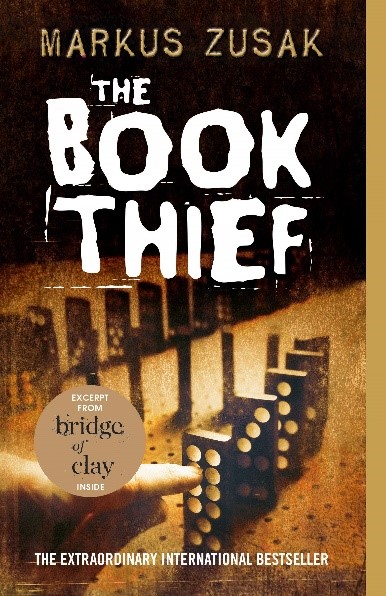
During daily hour-long car drives, Markus Zusak’s The Book Thief was a friend who kept
me company. The moment I flipped open to my bookmarked page, the windows, roads, and
lights that surrounded me disappeared. I was suddenly standing on a street in front of Himmel
Street 33, watching young children, particularly a skinny boy and a blonde, agressive girl,
enjoying a muddy game of soccer. Then, I sensed a feeling of sadness, knowing that those very
children, their parents, and their friends would all collapse among hundreds of others under a
single explosion and the unprecedented flattening of Himmel Street, Molching – except for that
one blonde girl who would stand and mourn above the others to tell their story and hers during
the devastating Holocaust era. Of course, in other World War II stories, I watched the characters
suffer, their homes fall, and their loved ones die; but in The Book Thief, I felt it: the sharp sting of
a merciless soldier’s whip, the sudden grief of spying a friend in a death march, and the
uncontrollable heartbreak after witnessing the corpse of a best friend and Papa and Mama.
The novel primarily focuses on the hardships of one German girl named Liesel, and the
unanimous narrator initiates her story from her brother’s sudden death and her mother’s
abandonment. For a few years, she remains comfortable with the unconditional love of her
adopting father and best friend Rudy, meanwhile stealing books wherever and whenever she
has the urge to. (Although this thievery seems insignificant, its consequences save her from
falling with the rest of Molching.) However, Zusak surprises readers when her life takes a turn,
and Liezel finds herself hiding a Jew in her basement and praying for the consequences of her
father’s careless actions.
Throughout Liesel’s story, the narrator adds occasional notes, interrupting a serious or
devastating mood to either add humor to a situation or to hint at the narrator’s position and
identity in the book thief’s life. Not only do these small notes offer readers more information
about the setting and characters in the book, but also they give readers time to take several
quick breaths in between series of tragic events. This alternation between passages and notes
creates a rhythmic feel to the novel, thus engaging the readers.
The narrator’s stance guides readers along settings in both Molching and other parts of
Germany that have reached havoc before it. However, even with his blunt remarks and
foreshadowing “spoilers,” he does not keep readers from sitting on the edge of their seats and
experiencing the pain of the main characters. Therefore, with a combination of powerful,
emotional words and settings, The Book Thief carries readers along a dramatic journey of
friendship and love, and its regrets – the very emotions that all victims of the Holocaust
endured.
I would rate this book a 10/10, and I recommend it to young adults who are willing to be
swept away into a world created by the emotions in Zusak’s words.
Check out The Book Thief at the Newport Beach Public Library.